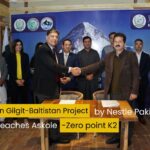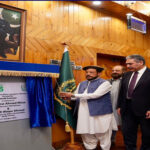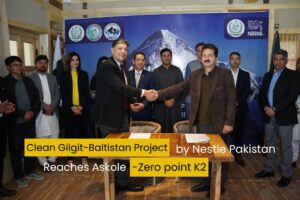The two Pakistani mountaineers are almost done climbing the tallest mountain on each continent. Their summit of Denali on June 28 leaves only Elbrus, the highest point in Europe at 18,510 feet, for the Baigs to climb together. Once complete, Samina Baig will have climbed all seven mountains, becoming the first Pakistani and first Muslim woman to do so. Mirza Ali Baig has to return to Mount Everest for some unfinished business before the two can claim the title of the first siblings to tackle the seven summits together.
As the taste of the rations from the most recent expedition fades, their goal looms within sight. The two are attempting a feat in a matter of months that takes many of the best mountaineers years to finish. They reached the top of Aconcagua in December, Vinson Massif in January, Kilimanjaro in February, Carstensz Pyramid in March and Denali in June. The expedition up Elbrus is planned for the end of July.
As the climbers travel the world, summiting mountain after mountain with international support, they have developed the idea of adventure diplomacy. No longer are they just climbing for women’s rights, but they are bringing people together from different nations and cultures. “There are no such boundaries in the mountains when you go. You are not American. You are not Pakistani. You are not Indian. You are a mountaineer. You are a human,” Mirza Baig said.
Before leaving the United States, the climbers spent some time in Santa Fe with Diana MacArthur, a Santa Fe woman who is building a school in Pakistan. When meeting them in Pakistan after they climbed Everest, she decided to sponsor their Denali expedition.
Also known as Mount McKinley, Denali is North America’s tallest mountain. On the 18-day climb up to the top of the 20,237-foot peak, loaded down with heavy packs and dragging sleds, each carried more than 150 pounds of gear and food. Verified by the park rangers, the Baig siblings were the first Pakistanis to summit the mountain, adding to their long list of first-time accomplishments.
In May 2013, Samina Baig became the first Pakistani woman and youngest Muslim to reached the summit of Mount Everest, the highest point on Earth at 29,029 feet. The triumph quickly evolved into a new challenge. “When we were done with Everest, in base camp, I told her we are going to do the seven summits,” Mirza Baig said.
Their purpose and motivation was far from a personal endeavor to be the first Pakistanis to complete the challenge. They created the Pakistan Youth Outreach Program and were using mountaineering to empower women through adventure sports as well as educate and build awareness among the youth about the outdoors. “Women need opportunity and encouragement,” said Samina Baig, emphasizing they can overcome other figurative mountains if given a chance. “If a girl can climb mountains, she can do anything positive within her field of work.”
As Mirza Baig put it, climbing mountains is a sport that one does not win or loose. It is a sport where one dies or survives. “Mountaineering is extreme sport. It has louder voice. It has great impact. It’s not traditional in [Pakistan]. If you come out of the line, then you are recognized,” he said.
It was near the top of Everest where the two showed the world their dream. “We were climbing together for gender equality and women empowerment, and he turned back 248 meters short from the summit to let me go on my own … to the top of the world,” Samina Baig said.
By turning around, Mirza Baig, the more experienced mountaineer who trained his younger sister, showed complete faith in her ability to summit without him. She was capable of accomplishing her own goals, driving home the point that if women are treated equally, they can make a positive contribution to society. He sent his Sherpa with the summit party, going back to Camp IV alone on the South Col route. He waited nine hours for them to return, in the “death zone,” before helping them with the rest of the decent. The death zone is above 26,000 feet, named for the harsh conditions and the human body’s inability to acclimate at such an altitude.
“My main target was her last year. We had another three-day weather window. I could have gone with the other groups. I could have gone with my Sherpa, but my main target, seven years of work was [her],” he said.
For Mirza Baig, it all began in his teen years. “When I started, I had maybe one-dollar or two-dollar shoes, broken shoes, bought from a secondhand market in Pakistan. I was 16 years old when I started. I had absolutely nothing,” he said, explaining it took him seven years to raise the $100,000 they needed for the Everest expedition.
The two are from a small village on the border between Pakistan and China called Shimshal, located in the upper Hunza of the Gilgit-Baltistan. They grew up in the Karkorum Mountains at an elevation of almost 11,000 feet. “The only thing we had was passion and determination,” Samina Baig said. The Karkorum is home to the world’s second-tallest peak, K2, and regarded by many mountaineers as more challenging to climb than Everest.
“When I was in grade five or six, he used to tell me when I grow up, we will climb mountains together,” Samina Baig said.
In 2010, they started the Pakistan Youth Outreach Project and organized an expedition up a 21,000-foot virgin peak. After their successful trip, it was renamed Samina Peak to honor the first Pakistani woman to make a first accent.
Finally, with the financial support from friends in New Zealand, the siblings left the Karakorum for the Himalayas to make history.
Now that their journey is on the last stretch, the two want to promote mountain climbing in their country, which is home to many of the world’s tallest mountains. To enable more Pakistanis to become mountaineers, they are starting the Institute of Winter Sports and Natural Sciences. “There is no such institute in Pakistan related to tourism, related to outdoor sports. …After the seven summits, that is the main target,” Mirza Baig said.
Currently, they are working with MacArthur and the Al-Murtaza Academy, the school she is building, to pilot an outdoor education program.
To contribute to their adventure, the Pakistan Youth Outreach Project, contributions can be made through MacArthur’s nonprofit, The i-Care Fund America Inc., 55 Anderson Street, Suite 445, Boston MA, 02114. In the memo field, write AMESWO/AMA-PYOP.
The Seven Summits
Asia: Everest, 29,029 feet summited by Samina Baig, May 2013; Mirza Baig’s summit attempt in April 2014 was prevented by a tragic avalanche and the closing of the mountain to climbers.
South America: Aconcagua, 22,829 feet summited by Samina and Mirza, December 2013.
Antarctica: Vinson Massif, 16,067 feet summited by Samina and Mirza, January 2014.
Africa: Kilimanjaro, 19,340 feet Summited by Samina and Mirza, February 2014.
Australasia/Oceania: Carstensz Pyramid, 16,023 feet summited by Samina and Mirza, March 2014.
North America: McKinley 20,237 feet summited by Samina and Mirza, June 2014.
Europe: Elbrus, 18,510 feet; expedition planned for July/August 2014.
Also, watch for their latest documentary film, Beyond the Heights, which is to come out in December. See the trailer at vimeo.com/52640690.
santafenewmexican.com























